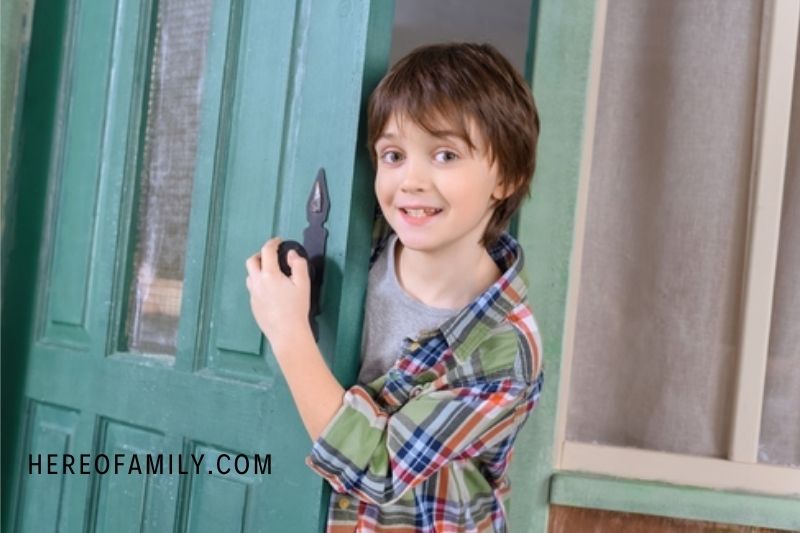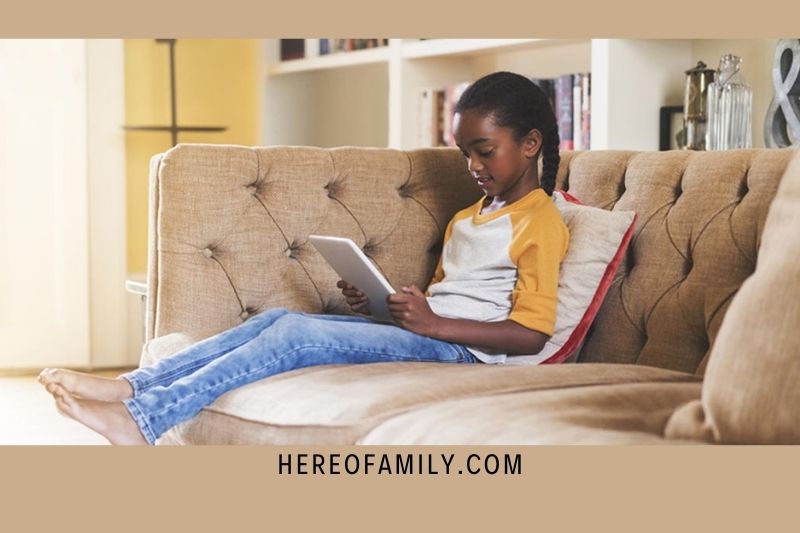There is no federal law in the United States regarding the legal age to stay home alone by state. It is up to each state to set its laws and regulations on the matter. Generally speaking, the legal age for staying home alone ranges from 8 to 12 years old, with some states setting a specific age while others leave it up to the parent or guardian’s discretion.
Contents
- 1 Legal Age To Stay Home Alone By State And The Law
- 2 How to Know If a Child Is Ready to Stay at Home Alone
- 3 When Can You Leave a Child Home Alone: Safety Tips
- 4 Is It Better To Leave An Only Child Home Alone Or Is It Better If There Are Siblings?
- 5 Action Plan for Leaving Kids at Home
- 6 FAQ
- 7 Conclusion
Legal Age To Stay Home Alone By State And The Law

Only a few states, notably Maryland (age 8) and Illinois (age 12), define a legal age for leaving a kid at home alone (age 14). Most states, however, have standards with the Department of Health and Human Services or other child protective organizations that assess a kid’s capacity to be left at home alone.
The child’s age and maturity, the general safety of the surrounding area/circumstances, and the preparations taken to ensure the child’s safety are all factors.
The following are common principles to follow when determining the age range at which children may be left alone at home:
- 7 and under – Should never be left alone for an extended time. This includes leaving children alone in automobiles, playgrounds, and backyards. The risks in the surroundings and the caretaker’s capacity to react would be the deciding factors.
- 8 to 10 years – Should not be left alone for more than 112 hours and only be left alone during daytime and early evening hours.
- 11 to 12 Years – Can be left alone for up to 3 hours, but not late at night or in conditions that need improper responsibility.
- 13 to 15 years old – Can be left unattended but not overnight.
- 16 to 17 years old – Can be left unattended (in some cases, for up to two consecutive overnight periods).
How to Know If a Child Is Ready to Stay at Home Alone

It’s crucial to remember that no two children are identical, and parents must determine what’s best for their kids on a case-by-case basis. In addition to the basic rules stated above, a parent or caregiver should consider the following before leaving a kid at home alone:
- The child’s age and maturity level;
- The amount of time the kid will be required to spend at home alone; if the youngster works well alone and follows instructions;
- The number and age of additional children remaining at home;
- The safety of the surrounding community, neighbors’ willingness to check in on the youngster throughout the day, and if the child would feel “comfortable” being at home alone.
When Can You Leave a Child Home Alone: Safety Tips
Finally, if leaving children at home alone is unavoidable, at least in the case of older children, the following guidelines might be followed:
- Ensure the youngster remembers their entire name, address, and phone number.
- Post a list of emergency, local, and long-distance phone numbers to contact in an emergency.
- While you are gone, call the youngster numerous times during the day.
- Teach the youngster how to use the locks on the windows and doors and lock them while they are not in use.
- Inform the youngster that they should not enter other people’s homes (including neighbors’) without your consent.
- Designate a “safe place” for the youngster if they feel threatened.
- Never let a youngster use an oven or stove without the supervision of a parent or an adult caregiver.
Consider school, organization, and church activities as an alternative to leaving a youngster at home alone for lengthy periods.
Aside from the precautions stated above, it’s always good to notify close neighbors that your kid may be home alone on certain days. A neighbor can be a valuable resource in an emergency, but it may also assist in reducing calls to child protective services from uninformed neighbors.
Is It Better To Leave An Only Child Home Alone Or Is It Better If There Are Siblings?
This topic can only be addressed on a case-by-case basis, but there are a few general recommendations to follow when deciding whether or not to leave siblings at home together.
To begin with, simply because a kid exhibits the abilities mentioned above and habits to be safe at home does not imply that they would be as effective with a sibling around.
Consider “adding a sibling” equivalent to “adding another ball to juggle.” Sure, they can take care of themselves as individuals, but can they do both when faced with a new distraction or a new responsibility to manage?
Furthermore, if sibling rivalry is a problem in your family, keeping the kids at home together is usually not the greatest option.
Here are a few things to think about before deciding whether they’re better together or better apart…
- How long do you intend to be gone?
- What are the children’s ages?
- Can they operate together without one of them “taking charge”?
- Have they constantly shown proper conduct to one another?
- Do they use suitable conflict-resolution techniques?
This, like anything else in parenting, takes time. Before introducing a sibling, make sure your youngster feels comfortable being at home alone.
If you leave siblings at home together, don’t put one in charge of the others–it’s a formula for sibling rivalry and hatred. Instead, assign each youngster a distinct task–one is in charge of cooking lunch, another is cleaning up, another chooses the movie, etc. While mum is gone, they will be working as a team to ensure the afternoon’s success.
Action Plan for Leaving Kids at Home
Okay, my buddy, after much thought, you’ve chosen to flap your wings and leave your baby at the nest for a little while. So, what now?
It’s time to put everything through its paces. Don’t plan on being gone for more than 2 hours the first time.
Before you go, ensure sure any risks are locked up. You’ll have more peace of mind knowing you’ve left your kid in a secure place, no matter how much you trust them. Here are a few things to make sure you have:
- Guns
- Alcohol
- Medication
- Guns
Then it’s time to go through some situations. Is your youngster aware of what to do if:
- Is there a fire in the kitchen?
- What if the smoke detector goes off?
- Is there a tornado or other kind of extreme weather?
- Is it true that a stranger has knocked on the door?
- Does someone summons a parent who isn’t at home?
- Is there a power outage?
Finally, establish some basic ground rules and display them as a reminder.
- Friends are not permitted to visit.
- Don’t let anybody in by opening the door.
- There is no stovetop cooking.
- Contributions from the whole family
- Never inform anybody, even friends, that you’re home alone, and don’t post anything on social media.
- Finish your assignments before using electronics or watching television.
- If there is an emergency, contact 911 first, followed by a parent.
- It would help if you did not leave home.
Some relevant posts:
- Does Baby Powder Cause Cancer? Complete Guide 2023
- Best Baby Breathing Monitor: Keep Baby Safe and Sound 2023
- Is Wifi Safe For Babies? Top Full Guide 2023
- How To Help Choking Baby? Top Full Guide [2022]
- Check Neighborhood Safety 2023: Top Full Guide
- Is Daycare Safe For Infants 2023? Top Full Options Here!
- Where To Put Baby Monitor? Top Full Guide [2022]
- When Should You Babyproof Your House? Top Full Guide 2023
- Bathroom Safety For Kids 2023: Top Full Options
FAQ
Can a 12-year-old stay home alone in California?
There is no explicit rule in California governing the age at which a kid may be left alone at home. Factors such as the child’s maturity and emotional level and any physical or psychiatric disorders or limitations must be addressed.
At what age can a child be left alone overnight?
Babies, toddlers, and children under the age of three should never be left alone. Children under the age of 12 are seldom mature enough to deal with an emergency and should not be left alone at home for an extended amount of time. Children under the age of sixteen should never be left alone overnight.
Is leaving a child home alone neglect?
If you leave your kid with someone unable to care for them, this may be considered neglect under the law. If you leave your kid at home alone with a babysitter under the age of 16, make sure they are familiar with what to do in an emergency and are mature enough to take action if necessary.
Conclusion
The age at which a child can be left home alone varies by state but is generally around 12 years old. Some states have specific laws about the age at which a child can be left home alone, while others do not. When to leave a child home alone should be based on the child’s maturity and ability to handle responsibility.
